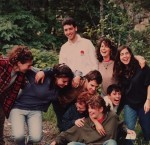Madrichim at Camp Miriam palling around in summer 1990. The author is in front. (photo from Mira Sucharov)
On a little corner of Gabriola Island lies an enclave of old-style Jewish utopianism. Modeled after a kibbutz, campers (chanichim) and counselors (madrichim) talk about heady topics like radical justice, equal worth, unionization, socialism and Labor Zionism.
They learn Hebrew, engage in physical labor and debate topics like whether O Canada adequately addresses the reality of First Nations, the fate of the Palestinians, and how to make a radically inclusive society within Israel. It’s Camp Miriam, part of the network of Habonim-Dror camps across North America. Among the founders of the camp was my grandmother, Marian Margolis, and I spent one memorable summer there as a counselor in 1990.
A lot has changed in Israel – and especially across the kibbutz movement – over the decades. I spoke to the current rosh (director), 22-year-old Leor Laniado, a student at the University of British Columbia majoring in environmental and sustainable geography.
The camp instils in its campers the value of “shivyon erech ha’adam,” a principle that every human being is of equal worth. It’s heady stuff for 10-year-olds who don’t measure themselves in terms of professional status anyway, but the idea is there. Alongside the usual fare of swimming, sports and crafts, campers choose a daily work branch where each task is valued. Fittingly, bathroom-cleaning detail has become one of the most popular options, Laniado tells me.
Campers also have a long tradition of running a kupah (common fund). An initial donation of pocket money is placed into a pot where campers decide how to spend it. Maybe the kids want to pool the funds for a party, maybe a portion will be donated to charity, maybe one camper needs a new toothbrush and applies to the treasurer – who is, of course, a fellow camper.
Rachel Fishman logged eight years as a camper before joining the staff. She values how much she sees Camp Miriam embodying the ideals of youth empowerment. Within limits, she points out, “youth are given space to make their own society.”
Trilby Smith spent 13 summers at Camp Miriam and is currently vice-chair of the camp committee. She sends both her kids to Miriam so “they can develop a sense of community defined by their peers, so that they can be in an environment that is open to questioning and thinking critically about Israel and what it means to be Jewish, and so that they can learn to be leaders.” And, she added, “So that they can have fun!”
Socialism isn’t the only tricky concept permeating the walls of the dining hall. (Yes, campers even do the dishes.) So, too, is Zionism. “I think that Jews in the Diaspora are facing a crisis of how to support Israel. A lot of madrichim struggle with this internally, especially studying in liberal universities,” Laniado said. It’s about “simultaneous love and criticism” at Miriam. “Recognizing that we’ve created a vibrant Israeli society, there’s a lot of work that remains to be done,” she said.
In Israel, Habonim-Dror partners with Hanoar Haoved on projects such as teaching English in Arab high schools. Called the Shared Existence project, it seeks “a joint liberation of both Israelis and Palestinians, striving towards a diverse and vibrant Israeli commonwealth,” in Laniado’s words.
Struggling with Israeli-Palestinian relations and with Zionism is a common refrain these days, but what Camp Miriam – and Habonim in general – manages to do is offer a way for youth to grapple with these issues head-on rather than abdicate altogether. Abdication – or what sociologists have been calling a “distancing” from Israel and Jewish life – is one of the biggest challenges.
These days, the radical secularism that I recall from the summer of 1990 has been replaced by an inching towards Judaism. While they still forego the Hamotzi in favor of a Labor Zionist chant, campers are now more likely to hear about Jewish values, embrace Jewish texts or be treated to a discussion by the rosh on the weekly Torah portion.
While the simple porridge my Baba Marian made for the campers in the 1950s when she was the first “camp mother” has been supplemented by scrambled eggs, fruit salad, yogurt and granola, along with gluten-free and dairy-free options, Zionism is wrestled with rather than taken for granted as a simple solution to the ills of antisemitism, and a commitment to Hebrew is now paired with a desire to “engage with Arabic language and culture.” The big values – leadership, debate, a commitment to Israel, Jewish identity, justice, labor and inclusiveness – remain.
For more information on Camp Miriam, visit campmiriam.org.
Mira Sucharov is an associate professor of political science at Carleton University. She is a columnist for Canadian Jewish News and contributes to Haaretz and the Jewish Daily Forward, among other publications.

